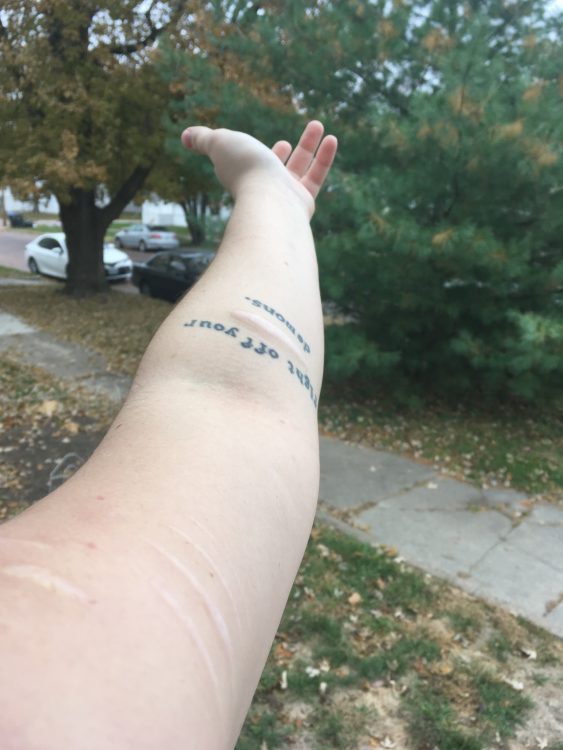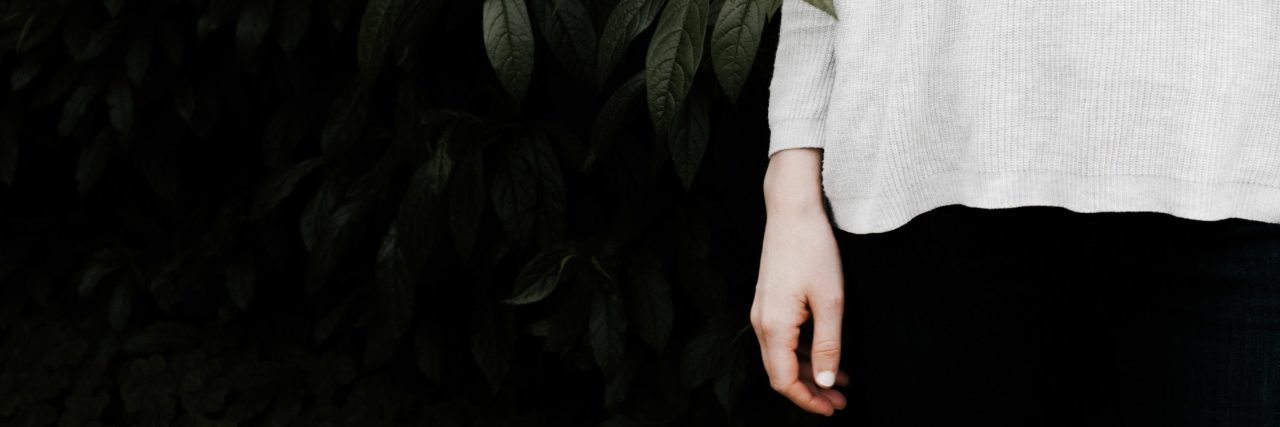Editor’s note: If you struggle with self-harm, the following post could be potentially triggering. You can contact the Crisis Text Line by texting “START” to 741-741. For a list of ways to cope with self-harm urges, click here.
Everyone makes mistakes; it’s an inescapable fact of life, and one I’m OK with. However, one of the other inescapable facts of life is that some mistakes hurt more than others, and, more to the point, some mistakes leave marks that last longer than others.
As someone who self-injured for more than a decade, I have plenty of scars. Most of them have faded, but even the faded ones have remained. Deep scars still cover my arms and my legs and my sides — constant reminders of the battles I lost in the war against myself. And although I have come to terms with these scars and the memories that accompany them, others have not.
I no longer pay any mind to the stares of strangers. I don’t even really mind it anymore when they make weird comments — insisting I cover my skin or asking how I’m doing. What I do mind is the random touches, as if strangers feel that because I have scars and tattoos, they have the sudden and strange right to grab my arm so they can extend the length they’re able to stare. I’ve never been pregnant, but I assume it’s similar to the feeling a woman gets when random strangers will come up and touch her belly, then lecture her on what she should and shouldn’t be eating. Because she has another life growing in her, she no longer has liberty of her own body. Or, if you like, it feels the same way as being abruptly catcalled or groped, even if you aren’t wearing anything that would elicit any such response (the feminist commentary on which we’ll save for another time). In the same way, my protests and my right to personal space tend to lose credibility whenever my scars and ink are visible.
As annoying as it is having my thoughts and body grabbed randomly by strangers, all it is is an annoyance. Being randomly grabbed or accused by family is a much more jarring experience.
I was probably 19 when my father “outed” me to my extended family as someone who had once self-injured (although he’d outed me in every other respect far before that). I remember it vividly. I was wearing an adorable pink babydoll tank top from a store I used to work at.

My grandparents arrived, and I left to go grab a cardigan from my room. I had set it aside for easy access since it matched the rest of my outfit perfectly. But instead of being able to go and get it, my father physically pulled me back into the kitchen and forced me to show my scarred and tattooed arm to my grandparents. He forced me to stay there and tell them out loud that the scars were from self-harm.
I had to watch the realization hit them. I had to watch the light dim in their eyes. I had to watch the pain move across their faces.
I have never felt more ashamed of myself than I did then, before or since.
I confronted my father about it, and his reasoning was that they were going to see the scars and tattoos on my arm anyway. I told him I’d been going to get my sweater, and he just shrugged and said something to defend himself that I can’t remember anymore. What I do remember, however, is the fact he never apologized for what he did, and the look on my grandparents’ faces when he did it. He didn’t apologize for the subsequent conversations I wasn’t a part of that caused the same kinds of looks from my aunt and my cousins.
It’s a look that’s some weird combination of hurt and betrayal and pity. It isn’t so much caused out of concern for you, but rather concern with how your condition affects them.
I don’t mean to sound callous when I say that. I say it because that’s what it is — they don’t care that you’re fine, or that you’ve been fine for years and that all that remains are scars. They don’t care that your tattoo is a sign of triumph to you, of victory in that war you’ve been fighting forever. All they know is that when they see the scars, they assume you’re still in the same kind of distress. You get massive amounts of that same kind of misdirected self-pity, but nobody can seem to accept it when you tell them, truthfully, that you’re fine. They instead insist that, of course, it will get better. You can get over this.
It always takes all of my strength not to sarcastically reply with, “Bitch, I am over it. Why aren’t you?”
It’s the feeling that equates them with strangers who grab my arm in a store or a restaurant. It’s the feeling that turns them from my family into strangers, because it makes me feel like they don’t care who I am now. They only care about the version of me they believe I am, even when it isn’t true and hasn’t been true for years.
I don’t mind having scars on my body. They’re a reminder of who I was and where I’ve come from. J.K. Rowling once said that rock bottom becomes the solid foundation on which you build your life, and I’m of the same persuasion — I hit rock bottom, and I grew from that. I got better, and that’s what matters to me.
One day, I’ll cover the scars on my arm with more tattoos, little bits of clockwork and lace and torn paper that turn the memories into art. But until then, I struggle with the fact that everybody else seems to equate scars with wounds, and lamely sit back and hope for the day when their stares will penetrate a little less deep and their random grabbing will be a little less jarring.

Usually, I can tell myself I made it out alive, and that makes me a warrior, but sometimes people make me feel like I’m nothing more than damaged goods.
I feel damaged sometimes, and that’s not OK. But I’m trying to make my peace with it. Wish me luck.
If you or someone you know needs help, visit our suicide prevention resources page.
If you struggle with self-harm and you need support right now, call the crisis hotline at 1-800-273-8255 or text “START” to 741-741. For a list of ways to cope with self-harm urges, click here.
We want to hear your story. Become a Mighty contributor here.
Lead Photo by Alexa Mazzarello on Unsplash. Photos in article via contributor.

